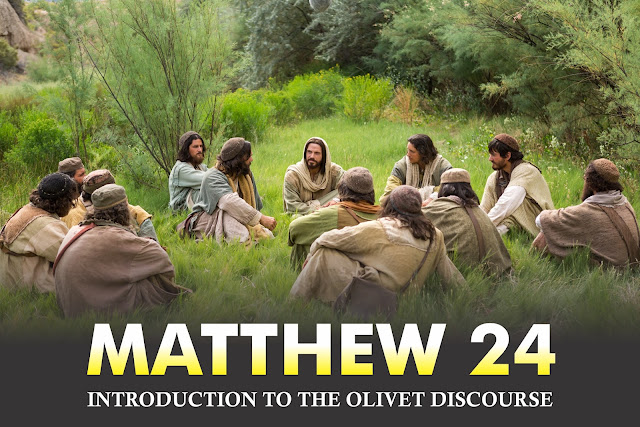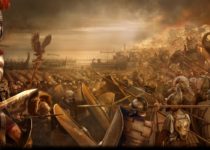MATTHEW 24: INTRODUCTION TO THE OLIVET DISCOURSE
We are beginning a study of Matthew 24 which is known as the Olivet discourse. We will take this series gradually so that we can examine the context and message. This is also a sermon on the mount. Its parallels can be found in Mark 13 and Luke 21.
Matthew, Mark and Luke are usually known as the Synoptic Gospels. Synoptic comes from two Greek words which mean “to see together” and literally means able “to be seen together.” These three gospels each give an account of the same events in Jesus’ life. There are in each of them additions and omissions; but generally speaking their material is the same and their arrangement is the same. It is therefore possible to set them down in parallel columns to compare the one with the other.
It is important to know that Matthew was the gospel that was written for the Jews. It was written by a Jew in order to convince Jews. One of the main objectives of Matthew is to demonstrate that all the prophecies of the Old Testament are fulfilled in Jesus, and that, therefore, he must be the Messiah. There is one phrase that is employed like an ever-recurring theme– “That it might be fulfilled which was spoken of the Lord by the prophet.” That phrase which comes in various form, occurs in the gospel as often as 10 times. The endpoint: Jesus is the prophesied Messiah.
Matthew is presented to the Jew as the fulfillment of prophecy in their very eyes. Let’s see some examples;
Jesus’ birth and Jesus’ name are the fulfilment of prophecy – Matthew 1:21-23, The flight into Egypt was prophesied – Matthew 2:14-15, Herod’s slaughter of all the young children in an attempt to kill Jesus was prophesied –Matthew 2:16-18
The triumphal entry of Israel’s Messiah, Jesus – Matthew 21:3-5, Jesus’ betrayal for thirty pieces of silver – Matthew 27:9
Matthew shows lets the reader know how every detail of Jesus’ life was foreshadowed in the prophets. The Jews knew very well the Old Testament teaching that the Messiah would bring in the promised Kingdom of Heaven. The kingdom was an earnest expectation from them.
The word MESSIAH is the transliteration of a Hebrew word meaning, “anointed one,” which is translated into Greek as Christos. They expected the Messiah to be a warrior who would conquer and expel the hated Romans from Israel and bring in a kingdom in which the Jews would rise to world dominion.
The three and half years of Jesus’ ministry Jesus raised a special set of disciples and He sought to wean the disciples away from the traditional notion of a warrior Messiah. Through his ministry he sought to change the old programming in their mindset. His unique ministry was constantly challenging their thought processes. He led them into the prospect that the road to His future glory as the Messiah was set to run by way of the cross, with its experience of rejection, suffering, and humiliation. Jesus taught them that His Kingdom was not of this world, it was not a physical kingdom but a spiritual one.
John 18:36 (NKJV), Luke 17:20-21
Matthew teaches us much about the Kingdom of Heaven. Often times this is confused to be heaven itself. 32 times in Matthew’s gospel Jesus talks about the Kingdom of Heaven. In his time Jesus spoke in Aramaic and the Gospel writers translated Jesus’ sermons and parables into Greek. Mark, Luke, and John translated Jesus’ words as “kingdom of God.”
Matthew sometimes used this phrase too, but often he preferred to translate Jesus’ Aramaic words as “kingdom of heaven.” The two phrases mean exactly the same thing, because they are translations of the same Aramaic words of Jesus.
What did Jesus mean when he spoke of the kingdom of God? He meant, quite simply, the rule of God. The kingdom of God is the influence and reign of God.
Matthew emphasizes throughout the coming kingdom and the judgement of all who reject it. From the beginning, there is John the Baptist’s call to repentance and warning of judgement to all who rejected God’s kingdom.
Now in those days John the Baptist *[a]came, [b]preaching in the wilderness of Judea, saying, 2 “Repent, for the kingdom of heaven [c]is at hand.” 3 For this is theone referred to [d]by Isaiah the prophet when he said,
“The voice of one [e]crying in the wilderness,
‘Make ready the way of the Lord,
Make His paths straight!’”
Make His paths straight!’”
7 But when he saw many of the Pharisees and Sadducees coming for baptism, he said to them, “You brood of vipers, who warned you to flee from the wrath to come? 8 Therefore bear fruit in keeping with repentance; 9 and do not suppose that you can say to yourselves, ‘We have Abraham for our father’; for I say to you that from these stones God is able to raise up children to Abraham. 10 The axe is already laid at the root of the trees; therefore every tree that does not bear good fruit is cut down and thrown into the fire.
11 “As for me, I baptize you [g]with water for repentance, but He who is coming after me is mightier than I, and I am not fit to remove His sandals; He will baptize you [h]with the Holy Spirit and fire. 12 His winnowing fork is in His hand, and He will thoroughly clear His threshing floor; and He will gather His wheat into the barn, but He will burn up the chaff with unquenchable fire.”
(Matthew 3:1-3, 7-12 )
Prior to that there had been four hundred years since the voice of the prophets had spoken. According to the prophecies that closed the old covenant Elijah was to show up before the Messiah arrived.
“Behold, I send My messenger,
And he will prepare the way before Me.
And the Lord, whom you seek,
Will suddenly come to His temple,
Even the Messenger of the covenant,
In whom you delight.
Behold, He is coming,”
Says the Lord of hosts.
And he will prepare the way before Me.
And the Lord, whom you seek,
Will suddenly come to His temple,
Even the Messenger of the covenant,
In whom you delight.
Behold, He is coming,”
Says the Lord of hosts.
2 “But who can endure the day of His coming?
And who can stand when He appears?
For He is like a refiner’s fire
And like launderers’ soap.
And who can stand when He appears?
For He is like a refiner’s fire
And like launderers’ soap.
Behold, I will send you Elijah the prophet
Before the coming of the great and dreadful day of the Lord.
Before the coming of the great and dreadful day of the Lord.
(Malachi 3:1-2, Malachi 4:5 )
John’s message was one of repentance or judgement. If they were truly familiar with the scriptures, they should have recognized him. Not surprising since they didn’t recognize him they also could not see Jesus as the promised Messiah.
And Jesus went about all Galilee, teaching in their synagogues, preaching the gospel of the kingdom, and healing all kinds of sickness and all kinds of disease among the people. – Matthew 4:23 (NKJV)
The things that Jesus did in his ministry should have made it clear to them who he was. Who else could do this but the promised Messiah of Israel. As Isaiah says in chapter 35:4-6;
Strengthen the weak hands,
And make firm the feeble knees.
4 Say to those who are fearful-hearted,
“Be strong, do not fear!
Behold, your God will come with vengeance,
With the recompense of God;
He will come and save you.”
And make firm the feeble knees.
4 Say to those who are fearful-hearted,
“Be strong, do not fear!
Behold, your God will come with vengeance,
With the recompense of God;
He will come and save you.”
5 Then the eyes of the blind shall be opened,
And the ears of the deaf shall be unstopped.
6 Then the lame shall leap like a deer,
And the tongue of the dumb sing.
For waters shall burst forth in the wilderness,
And streams in the desert.
And the ears of the deaf shall be unstopped.
6 Then the lame shall leap like a deer,
And the tongue of the dumb sing.
For waters shall burst forth in the wilderness,
And streams in the desert.
When John was in prison and began to doubt who Jesus was, he sent his disciples to ask if he was He that should come. Jesus said his works should make it evident that he was Messiah. – Matthew 11:4-6 (NKJV)
Jesus warns that those who reject him as Messiah and his kingdom will suffer judgement.
And I say to you that many will come from east and west, and sit down with Abraham, Isaac, and Jacob in the kingdom of heaven. 12 But the sons of the kingdom will be cast out into outer darkness. There will be weeping and gnashing of teeth.” – Matthew 8:11-12 (NKJV)
Now concerning the messiah and kingdom the Jews believed that when the Messiah came, there would be a great banquet at which all Jews would sit down to feast. They never believed that any Gentile would ever sit down at it. Jesus said that many shall come from the east and from the west, and sit down at the table at that banquet. Still worse, he says that many of the sons of the kingdom will be shut out. The Jews had to learn that the passport to God’s kingdom is not membership of any nation; but faith in the Son.
Jesus constantly warned the Jews of their coming judgement because of their apostasy. If you look closely you will discover that most, if not all, of Jesus’ parables deal with the kingdom of God or the destruction of Jerusalem because of their rejection of that Kingdom.
As we progress and move towards chapter 24, you will observe the building of the judgement theme.
“Hear another parable: There was a certain landowner who planted a vineyard and set a hedge around it, dug a winepress in it and built a tower. And he leased it to vinedressers and went into a far country. 34 “Now when vintage-time drew near, he sent his servants to the vinedressers, that they might receive its fruit. 35 “And the vinedressers took his servants, beat one, killed one, and stoned another. 36 “Again he sent other servants, more than the first, and they did likewise to them. 37 “Then last of all he sent his son to them, saying, ‘They will respect my son.’ 38 “But when the vinedressers saw the son, they said among themselves, ‘This is the heir. Come, let us kill him and seize his inheritance.’ 39 “So they took him and cast him out of the vineyard and killed him. 40 “Therefore, when the owner of the vineyard comes, what will he do to those vinedressers?” 41 They said to Him, “He will destroy those wicked men miserably, and lease his vineyard to other vinedressers who will render to him the fruits in their seasons.” 42 Jesus said to them, “Have you never read in the Scriptures: ‘The stone which the builders rejected Has become the chief cornerstone. This was the Lord’s doing, And it is marvelous in our eyes’? 43 “Therefore I say to you, the kingdom of God will be taken from you and given to a nation bearing the fruits of it. – Matthew 21:33-43 (NKJV)
Jesus had clearly prophesied that the Kingdom of God would be taken from the Jews and given to another nation who would bring forth fruit. The former based on the law could not bear the fruit that would delight the heart of the Father.
Let’s continue on in Matthew as we move toward chapter 24
And Jesus answered and spoke to them again by parables and said: 2 “The kingdom of heaven is like a certain king who arranged a marriage for his son, 3 “and sent out his servants to call those who were invited to the wedding; and they were not willing to come. 4 “Again, he sent out other servants, saying, ‘Tell those who are invited, “See, I have prepared my dinner; my oxen and fatted cattle are killed, and all things are ready. Come to the wedding.”‘ 5 “But they made light of it and went their ways, one to his own farm, another to his business. 6 “And the rest seized his servants, treated them spitefully, and killed them. 7 “But when the king heard about it, he was furious. And he sent out his armies, destroyed those murderers, and burned up their city. (Matthew 22:1-7 (NKJV)
The parable of the banquet gives foundation to the prophecy about the destruction of the city of Jerusalem. (To be continued)



